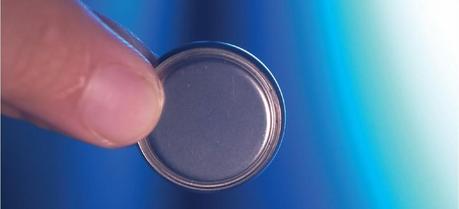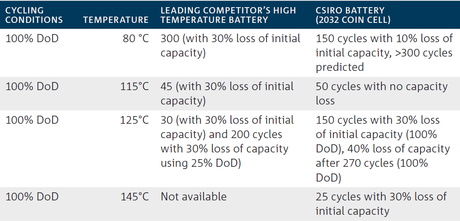 CSIRO’s high temperature battery. (Credit: CSIRO)
CSIRO’s high temperature battery. (Credit: CSIRO)As more oil and gas is extracted from mature, deep and ultra deep wells over the next few decades, the demand on battery power at extreme conditions will continue to increase. In response to this need, CSIRO, the national government body for scientific research in Australia, has developed a high temperature battery which can reliably operate at elevated temperatures with an extended lifetime.
The battery can meet electrical performance requirements while also maintaining a high degree of safety and reliability when operating at elevated temperatures. It will serve as an enabling technology for the oil and gas industry, particularly for downhole applications.

Performance of CSIRO’s High Temperature Battery compared to a traditional high temperature battery currently commercially available.
A wide range of applications, including measurement whilst drilling (MWD) and logging whilst drilling (LWD) tools, data transfer networks and other downhole applications such as sensors, control valves and electrohydraulic subsurface valves, require batteries to operate at elevated temperatures. Traditional lithium and lithium ion batteries are not suitable for such operating conditions because of high failure rates and high safety risks.
While a few high-temperature batteries are already commercially available, several issues arise due to the fact that these batteries can often only be recharged a limited number of times, after which they must be replaced. This requires the tool that was powered by the battery to be suspended, which may result in pipeline flow interruption or significant increase in cost.
CSIRO has constructed and tested prototype batteries using CSIRO-developed ionic liquid electrolytes to enable the reliable and short-circuit-free cycling of rechargeable lithium metal batteries.
CSIRO’s high temperature battery achieves significant improvements to the cycle life at operating temperatures of 80°C (176°F) to 120°C (248°F). Specifically, the batteries show better cycling performance and at 120°C over 100 cycles at a charge rate of C/7.5 and a discharge rate of C/3.75 at 100% DoD without any significant loss of capacity and cell failure, or over 150 cycles at a charge/discharge rate of C/10. The CSIRO-constructed batteries show good cycling performance after 6 months storage at 120°C, which is a significant improvement on the storage capacity of competitive traditional high temperature batteries.

